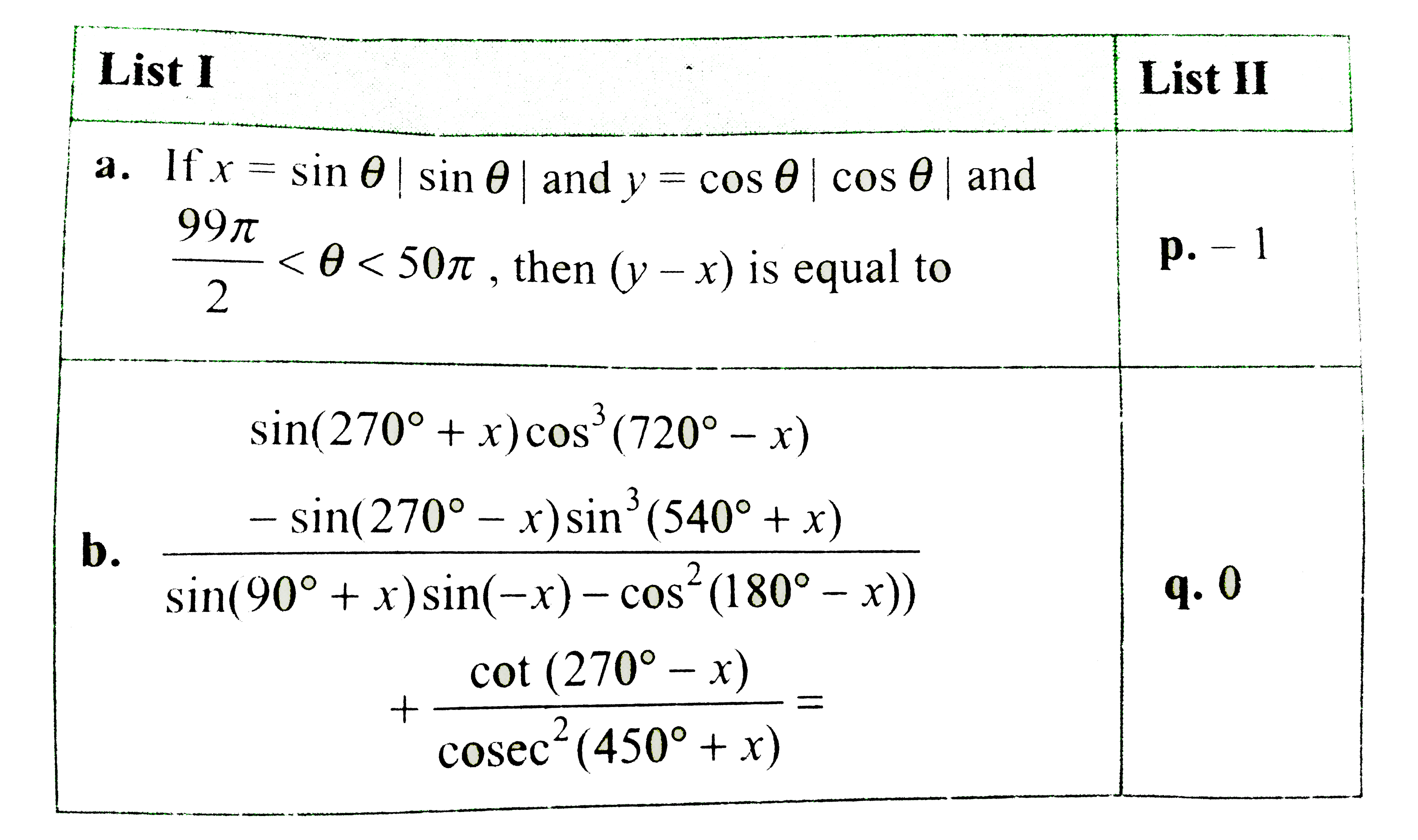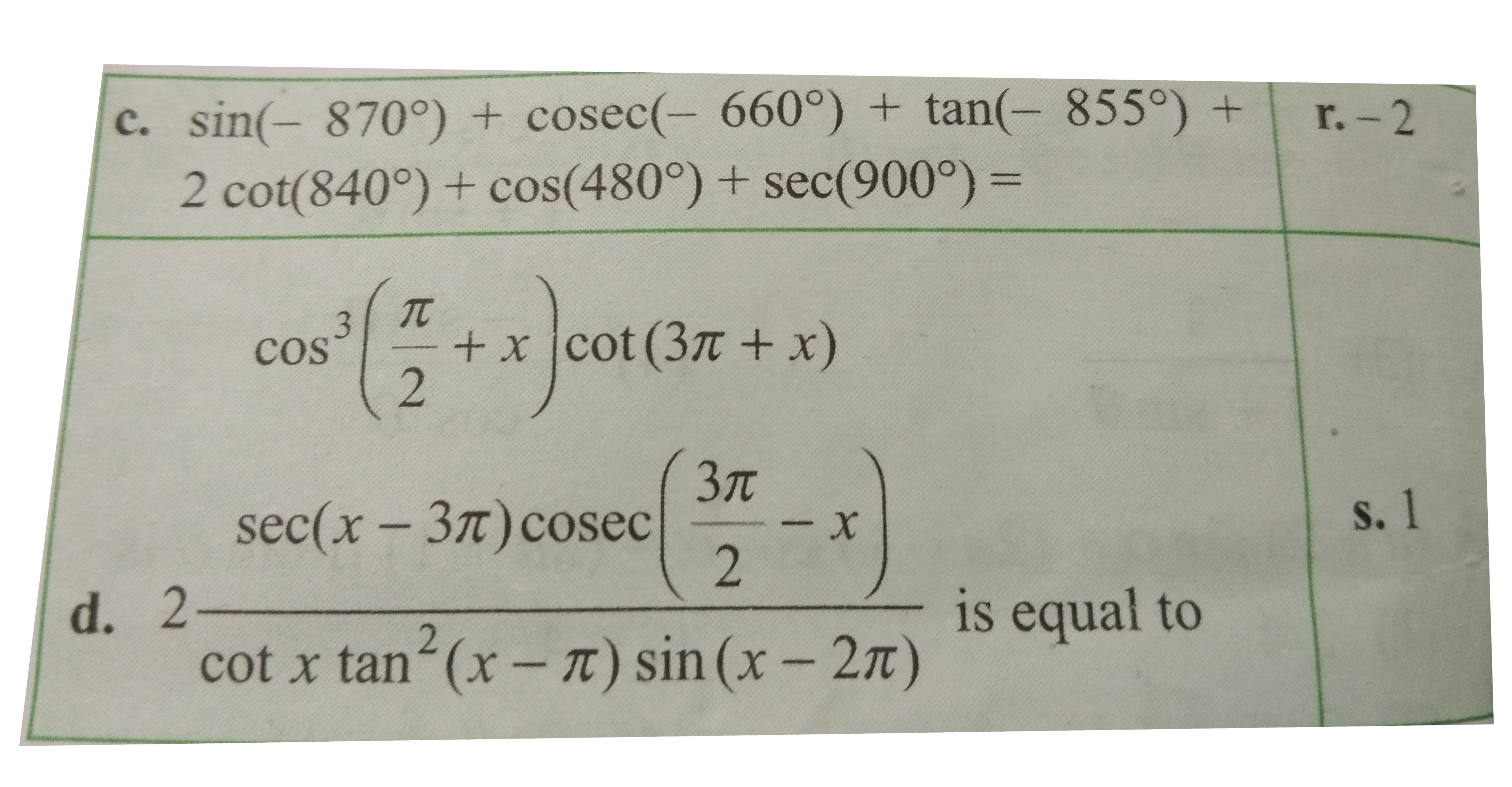α,β,γandδ are angle in I, II, III and iv quadrants, respectively and none of them is an integral multiple of π2. They form an increasing arithmetic progression. Which of the following holds? cos(α+δ)>0 cos(α+δ)=0 cos(α+δ)<0 cos(α+δ)>0orcos(α+δ)<0 Which of the following does not hold? sin(β+γ)=sin(α+δ) sin(β−γ)=sin(α−δ) sin(α−β)=tan(β−δ) sin(α+γ)=cos2β) If α+β+γ+δ=θandα=700, then 4000<θ<5800 4700<θ<6500 6800<θ8600 (d) 5400<θ<9000Solution in Tamil
400∘<θ<580∘
470∘<θ<650∘
680∘<θ<860∘
540∘<θ<900∘
The correct Answer is:C
0<α<90∘,90∘<β<180∘
180∘<γ<270∘,270∘<δ<360∘
⇒γ<270∘<α+δ<450∘
⇒α+δ lies in the I or IV quadrant and cosine in both is positive.
If d is the common ratio of theA.P., then
β=α+d,γ=α+2d,δ=α+3d
⇒β+γ=α+δ,2(α−β)=−2d=β−δ
andα+γ=2β,
Now, β−γ=−d,α−δ=−3d
270∘<δ<360∘
⇒270∘<α+3d<360∘
⇒200∘<3d<290∘(∴α=70∘)
⇒400∘<+6d,580∘
⇒680∘<4α+6d<860∘
680∘<θ<860∘
Topper's Solved these Questions
- TRIGONOMETRIC FUNCTIONS BOOK - CENGAGECHAPTER - TRIGONOMETRIC FUNCTIONS EXERCISE - Exercise (Matrix)
3 Videos
- TRIGONOMETRIC FUNCTIONS BOOK - CENGAGECHAPTER - TRIGONOMETRIC FUNCTIONS EXERCISE - Exercise (Numerical)
11 Videos
- TRIGONOMETRIC FUNCTIONS BOOK - CENGAGECHAPTER - TRIGONOMETRIC FUNCTIONS EXERCISE - Exercise (Multiple)
17 Videos
- TRIGONOMETRIC EQUATIONSBOOK - CENGAGECHAPTER - TRIGONOMETRIC EQUATIONSEXERCISE - Archives (Matrix Match Type)
1 Videos
- TRIGONOMETRIC RATIOS AND TRANSFORMATION FORMULASBOOK - CENGAGECHAPTER - TRIGONOMETRIC RATIOS AND TRANSFORMATION FORMULASEXERCISE - Matrix Match Type
1 Videos
Similar Questions


View SolutionThe value of the expression tan2200−sin2200tan2200+sin2200 is__________
View SolutionIf 0≤θ≤πand81sin2θ+81cos2θ=30 is
View SolutionFind the derivative of y=tan−12x3
View SolutionRefer to the following diagram :

Column IColumn IIa.Collinear vectorsp.→ab.Coinitial vectorsq.→bc.Equal vectorsr.→cd.Unlike vectors (same initial point)s.→d
View SolutionEvaluate Δ=∣∣ ∣ ∣∣0sinα−cosα−sinα0sinβcosα−sinβ0∣∣ ∣ ∣∣
View Solutionsin alpha, cos alpha, cos (alpha + delta) sin beta, cos beta, cos (beta + delta) sin gamma, cos gamma, cos (gamma + delta)] | = 0
View SolutionProve that det [[sin alpha, cos alpha, sin (alpha + delta) sin beta, cos beta, sin (beta + delta) sin gamma, cos gamma, sin (gamma + delta)]] = 0
View SolutionIf origin is the orthocenter of a triangle formed by the points (cos alpha*sin alpha,0)*(cos beta,sin beta.0),(cos gamma,sin gamma,0) then sum cos(2 alpha-beta-gamma)=
View SolutionIf A=(cosα,sinα,0),B=(cosβ,sinβ,0),C=(cosγ,sinγ,0) are vertices of ΔABC and cosα+cosβ+cosγ=3a,sinα+sinβ+sinγ=3b then orthocentre is
View SolutionEvaluate Δ=⎡⎢⎣0sinα−cosα−sinα0sinβcosα−sinβ0⎤⎥⎦
View SolutionEvaluate Δ=∣(0,sinα,−cosα),(−sinα,0,sinβ),(cosα,−sinβ,0)|}
View Solution{:|( sin alpha , cos alpha ,cos (alpha +delta) ),( sinbeta, cos beta,cos (beta+delta )),(sin gamma , cos gamma , cos ( gamma +delta ))|:}=0
View SolutionEvaluate Δ=∣(0,sinα,−cosα),(−sinα,0,sinβ),(cosα,−sinβ,0)|}
View SolutionEvaluate Δ=⎡⎢⎣0sinα−cosα−sinα0sinβcosα−sinβ0⎤⎥⎦
View SolutionEvaluate Δ=|0sinα−cosα−sinα0sinβcosα−sinβ0|
View Solution
